Illiterate Among the Literate
Baba Zareef’s dream of being educated was quashed at 11 with his father arrested. At 67, he now works as a janitor at a local school, a place he once hoped would change his life for the better.
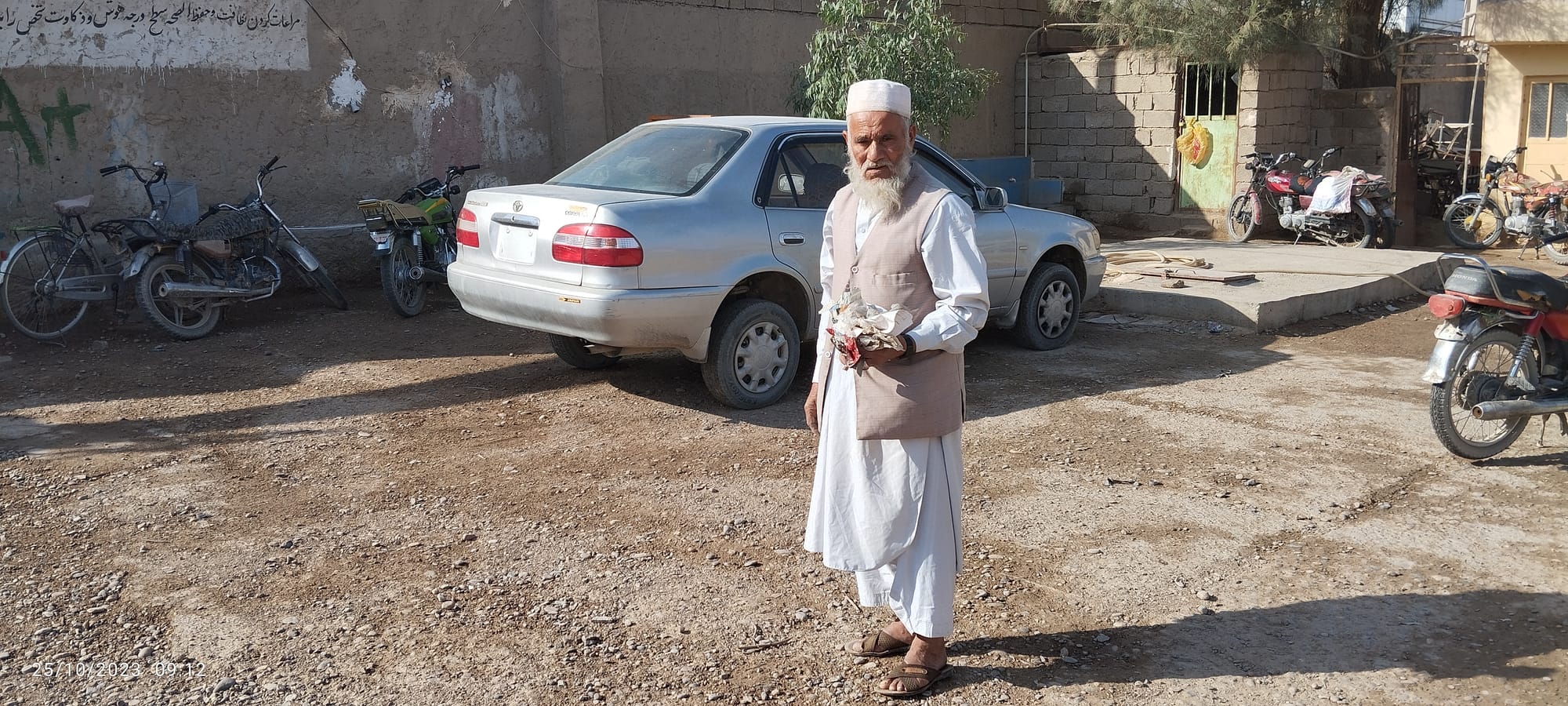
Written by Shaima Seddiqi
This profile is part of a broader series exploring changes regarding access to education in Afghanistan, created with support from Afghan Witness (a project of the Centre for Information Resilience), which uses open-source investigating to expose human rights violations and counter mis- and disinformation. This series will incorporate open-source techniques to further corroborate the investigative reporting. Please click here to read previous publications in the series by Alive in Afghanistan.
ZARANJ, NIMROZ — 67-year-old Mohammad Zareef was in the third grade when security forces affiliated with Afghanistan’s communist government, under President Nur Mohammad Taraki (1978 to 1979), arrested his father. His father was charged with espionage, and his family never heard from him again. Zareef asserts that the accusations were false; his father was a farmer.
Donate to support our team!According to a report by Human Rights Watch (HRW), an estimated 127,000 people disappeared in just 20 months after the communist regime seized power. Most were buried in mass graves that have yet to be exhumed, the report said.
Being the oldest son in his family, Zareef became responsible for taking care of his mom and four siblings when he was only 11. He had to stop going to school and start farming to feed his family.
Zareef’s dream of being educated was quashed in childhood as he struggled to keep his family fed. He worked as a farmer in Afghanistan for the next three years before migrating to Iran for work, hoping to escape poverty, which never became a reality. The following years and decades of his life were filled with instability and poverty as he and his family moved back and forth between Iran and Afghanistan.
For the last seven years Zareef has worked as a janitor at Shaheed Mohammad High, a public school in Zaranj City, the capital of southwestern Afghanistan's Nimroz province. Students and staff respectfully call him ‘Baba’ (Old man) Zareef.
ZARANJ, NIMROZ — 67 year-old Mohammad Zareef, the janitor of a local school in southwestern Afghanistan’s Nimroz province, spends all day cleaning the facility despite his old age. Videos by: Shaima Seddiqi
In this episode of One Day in Afghanistan, Shaima Seddiqi spends a day with Baba Zareef, who works in an education facility despite being illiterate himself.
Around 7 in the morning, I make my way towards Shaheed Mohammad High School. The city is quiet as it is still early for businesses to open, but the school gates open around 6, and Baba Zareef arrives earlier than the students to clean the classrooms and courtyard.
When I arrive at the school, Baba Zareef is unloading empty cans from the saddlebags attached to the back of his motorcycle, which he uses to carry drinking water home from the school. According to Baba Zareef, the water in his neighborhood is unpotable due to the high salt content.
“The motorcycle is like my legs for the road; I wouldn’t be able to walk that distance,” Baba Zareef tells Alive in Afghanistan. Although part of his meager wages goes to fuel for the bike and food for himself, he sees no other choice.
Originally from Posht Rod district of neighboring Farah province, Baba Zareef lives in Siadak a village on the outskirts of Zaranj–about 20 kilometers from the school.
He begins his day by filling up one plastic and one metal watering can from a well inside the school. Next Baba Zareef starts slowly spraying water over the dusty open yard. Once done, he refills the cans, carries them inside the hallway, and spends about an hour spraying water throughout the building to reduce the amount of dust in the air. He finishes just before foot traffic begins filing into the school and then uses a broom to sweep the remaining areas.
In addition to being a janitor, Baba Zareef makes and serves tea to school staff and guests.
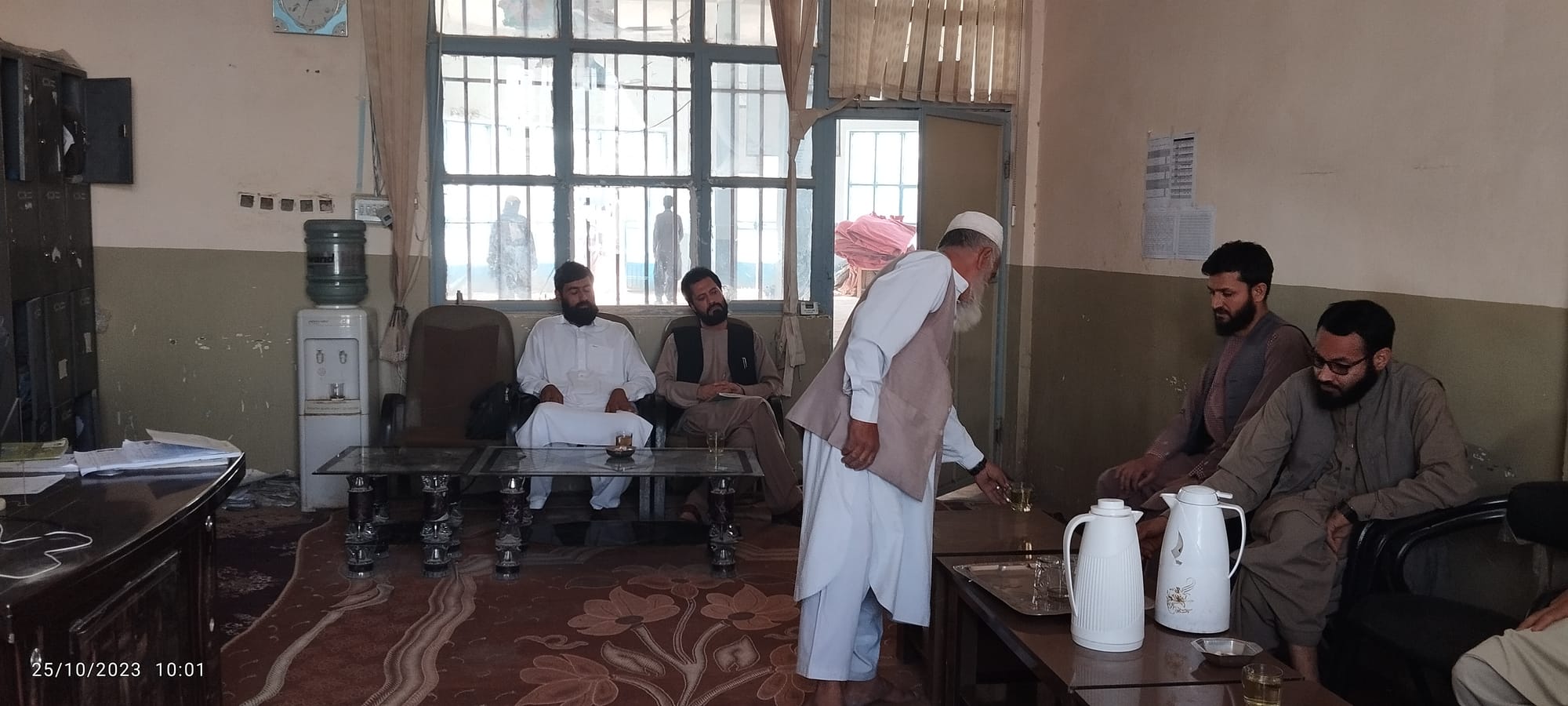
Baba Zareef is paid 5,200 Afghanis ($75) a month, which he says, “Does not get me through the month.” In addition to his income being insufficient to cover the basic cost of living, Baba Zareef also has to purchase medication and take care of his sick wife.
“My wife has been sick for 40 years; she cannot move without the help of others.” Baba Zareef says while picking up empty water and soda bottles as he walks around the school building, “Her medication and tests cost 2,500 Afghanis ($36) a month alone. She suffers from diabetes, shortness of breath, and stomach problems.”.
As Baba Zareef continues to work, he struggles through periodic episodes of coughing while sweat runs heavily down his forehead.
“When I collect trash, I sweat, and my feet hurt after walking 10 steps,” Baba Zareef says in desperation, adding, “The duty of an illiterate person is to collect trash, sweep, and do janitorial work.”
“I have endured poverty and humiliation all my life, and now I understand the value of education. If it weren't for our poverty, I would have studied; I would have been sitting comfortably in a chair, as a manager, or a teacher. Why would I struggle all day while sick?” He asks, frustrated at his situation.
After cleaning the school corridor and courtyard, he takes a moist cloth and begins to wipe the desks in the administration office. While cleaning, he talks about how much of his life was spent moving from one place to another.
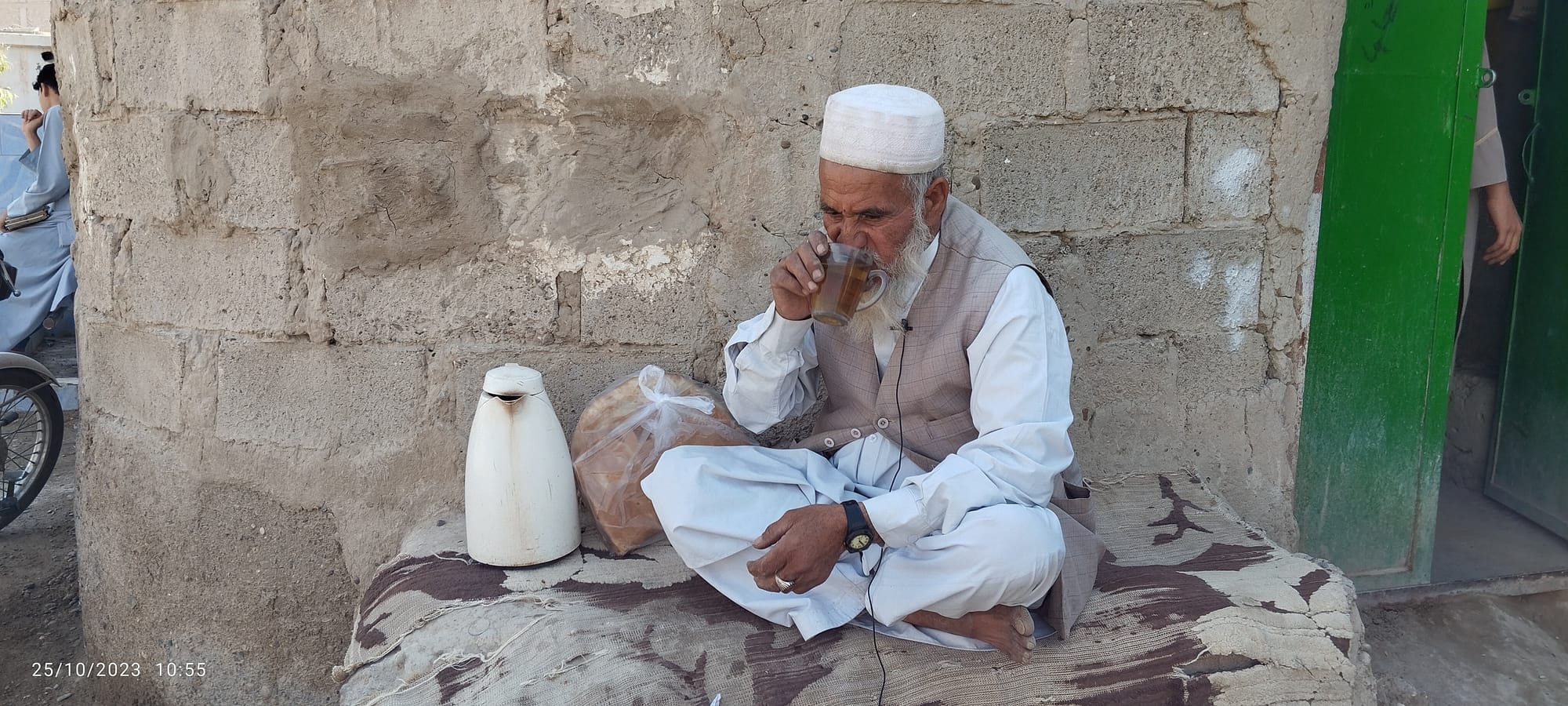
“I migrated to Iran twice. First, when I was 18, and the second time at the age of 27, poverty and instability prevented me from studying, while my children were deprived of education due to migration.”
Baba Zareef tells me all this while he keeps busy wiping one desk after another, at times picking up stacks of paper to dust off the desk under and putting them back after he is done.At 9 AM, Baba Zareef heads to the kitchen to prepare tea for the teachers before they go on break. He boils water over a gas stove and fills three white thermoses before taking them to the teachers. Baba Zareef pours a cup for himself as he takes a break. After the break, Zareef continues sweeping the facility, where despite his efforts, dust and dirt have accumulated everywhere.
He has his work cut out for him. When his break is over, he must gather trash from hallways and open spaces throughout the school. He tosses any cans and bottles he finds into a small room through an opening in the locked metal door. Baba Zareef sells used cans and bottles for 200 Afghanis at the end of every month, providing extra income for the frail old man.
At 11:50 AM, Baba Zareef sweeps through the rooms while the children are outside engaged in Physical Education. As he sweeps, the dust kicked up by the broom worsens Baba Zareef’s cough.
“I have been dealing with dust and pollution for seven years, causing me to have respiratory problems and develop kidney stones,” Zareef says, adding that he cannot afford a doctor with his minimal wages.
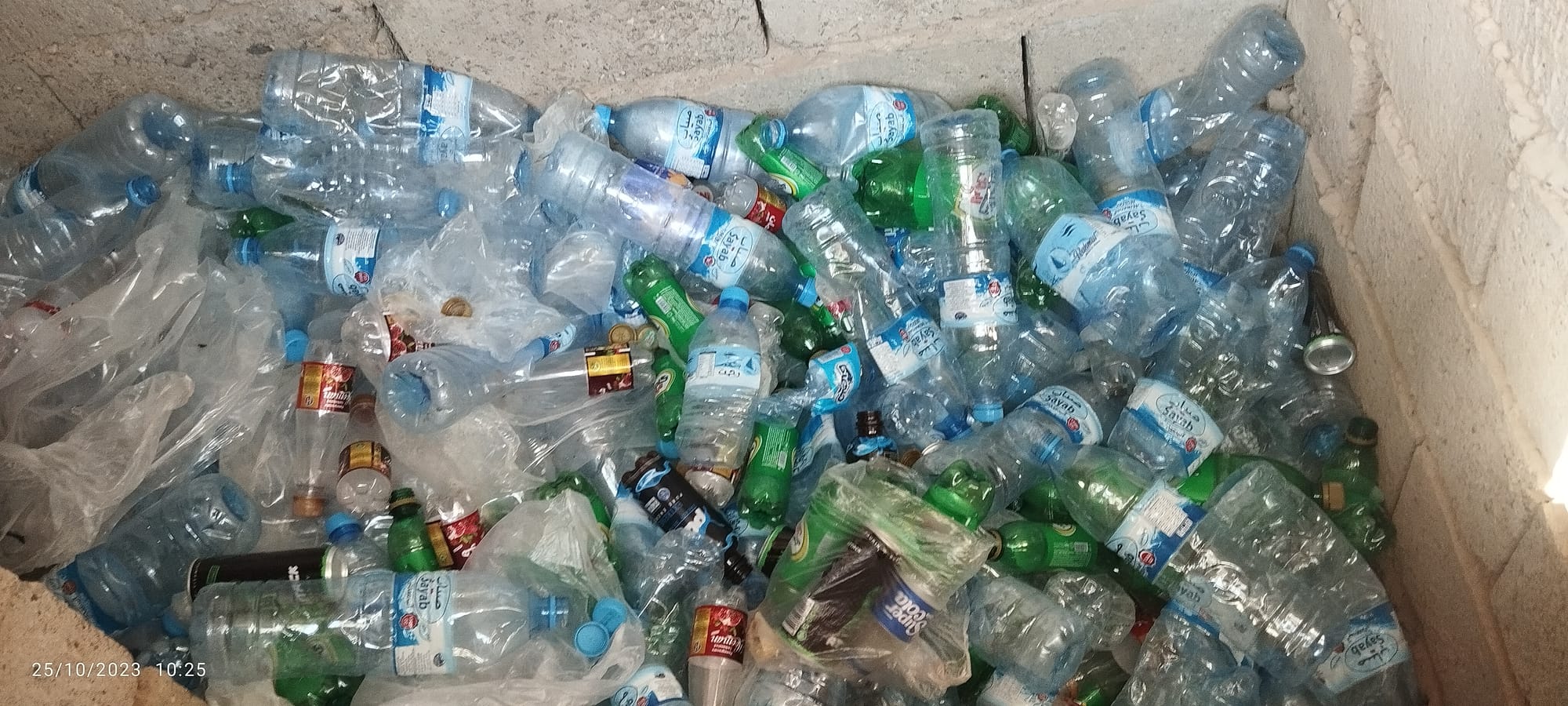
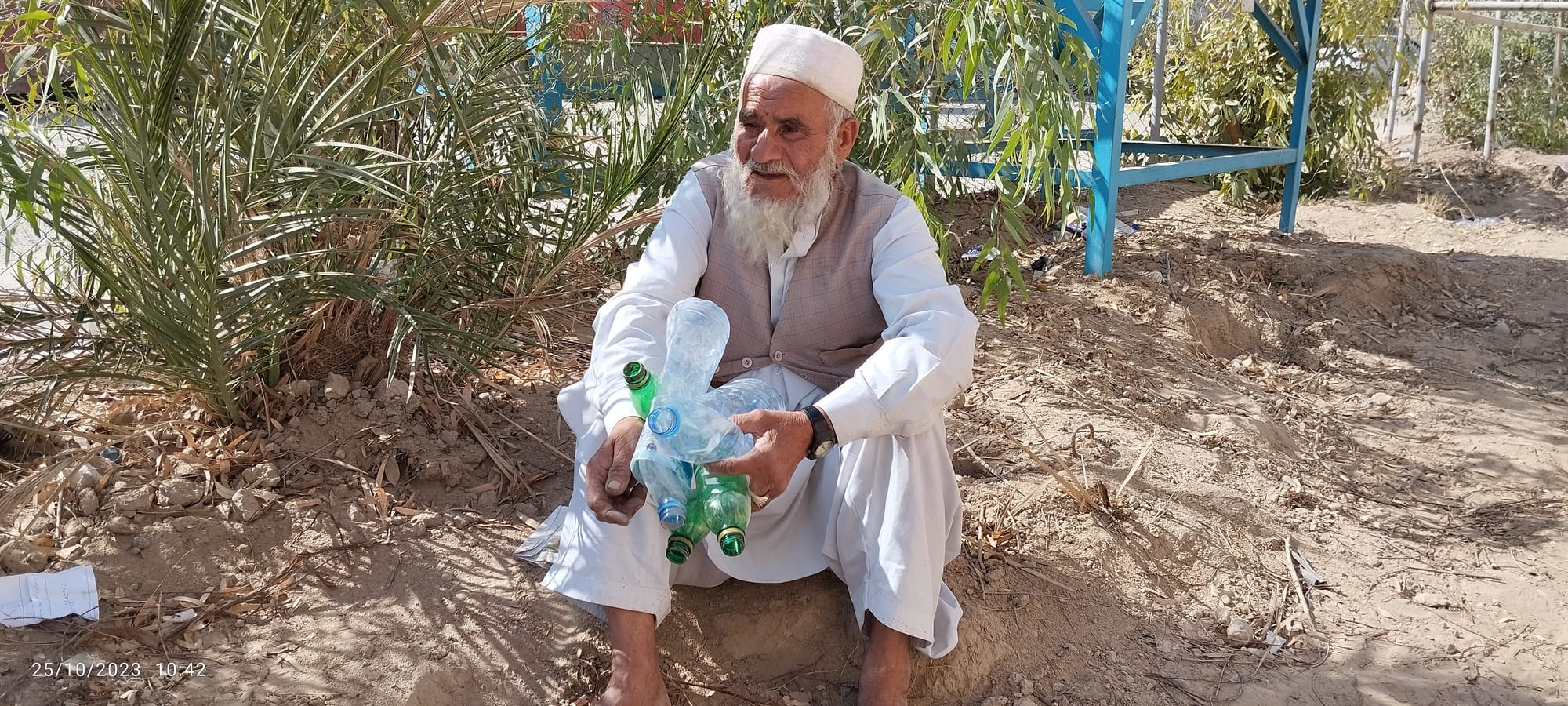
ZARANJ, NIMROZ — 67 year-old janitor “Baba” Mohammad Zareef collects and sells used cans and bottles for 200 Afghanis at the end of every month. Photos by: Shaima Seddiqi
Done with sweeping for the moment, Baba Zareef heads to staff offices to collect dirty dishes and bring them to the kitchen to wash. He continues working around the facility, doing a variety of tasks until 12:30 when the bell signals the end of the school day for the students.
Leaning against a tree after the students are gone, Baba Zareef speaks of events in his past.
“I was eleven when they (security forces under the Taraki regime) took my father away on charges of espionage, even though he had no political activity; he was a farmer. We still don’t know if he is dead or alive. I left school and started working on our farm instead of my father,” Baba Zareef says.
At the age of 15, he gave in to pressure from his mother to get married, a decision that buried him under a mountain of issues as a teenager. He started in Afghanistan for three more years before traveling to Iran to find work.
“My family lived in a tent in Talarud (an Iranian town near the Afghan border) for seven years. I would go to other cities in Iran to work and would come back with groceries every two months, but our misfortunes multiplied when my wife fell ill. I took her to every Iranian city, then to Pakistan, for treatment, but nothing helped,” Baba Zareef says.
Zareef returned to Afghanistan after seven years, only to go back to Iran two months later after finding no work. Zareef considers the second period of immigration the most challenging of his life.
“I went to Bandar-e Abbas (Iranian port city) empty-handed; we didn’t even have a tent, and my wife became seriously ill after,” Baba Zareef says.
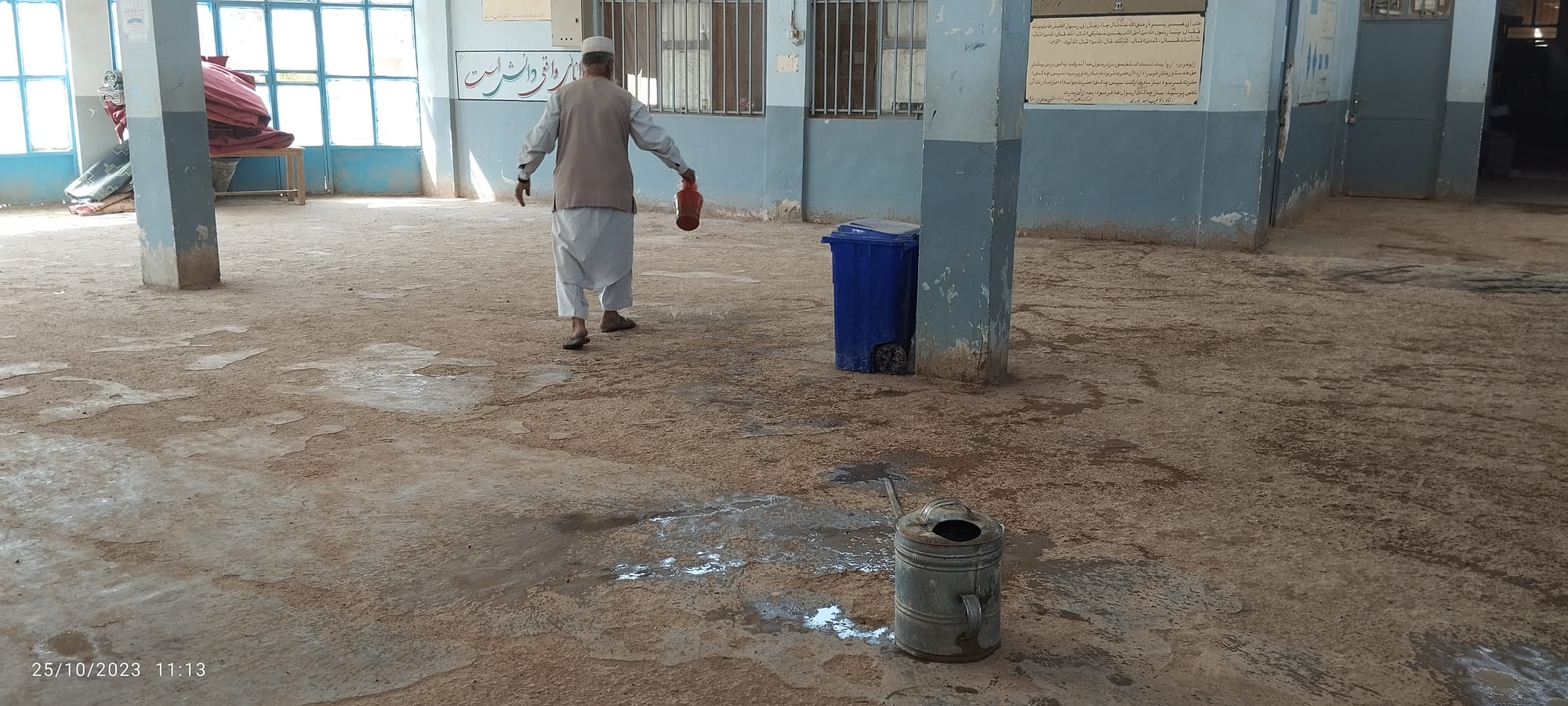
Baba Zareef says he regrets leaving school every moment of his life. Heading behind the school building he sees some students sitting under a tree scrolling through their phones. Sitting by a group of teenagers who respectfully smile at him, Zareef speaks to them about the pitfalls of illiteracy.
“God took my father away when I had a desire to study. Thankfully, you have fathers, mothers, and brothers who help you; they buy you pens and notebooks and provide the opportunity for you to study. Therefore, study, so your fate does not become like mine! God didn’t give me this blessing, now old and weak, I spend the whole day collecting trash,” Baba Zareef tells the children, while the one closest to Zareef keeps nodding his head in affirmation.
Zareef then heads to a nearby bakery to buy a piece of bread for lunch. Back at school, Zareef retrieves a pot of tea from the small makeshift kitchen, then takes a seat under the shade of a wall outside. He pours tea into a cup, rips off a small piece of bread, soaks it into the cup, and puts it in his mouth, chasing it with the drink. This is lunch for him.
“This is my daily diet; I spend 80 Afghanis a day ($1.16) on bread and fuel. Although this diet has exhausted me, I have no choice. My heart burns when I see colorful fruits and foods in the market. I wish I could buy them,” Baba Zareef says between bites of the bread and sips of tea.
“Being illiterate among the literate” is the pain he carries on a daily basis, something that, according to him, is felt less among other illiterate individuals. The lack of care or attention from his kids adds to Zareef’s heartache.
Baba Zareef’s message to Afghan youth is to study, “Because developed countries have reached the peak of success with education.”
Donate to support our team!